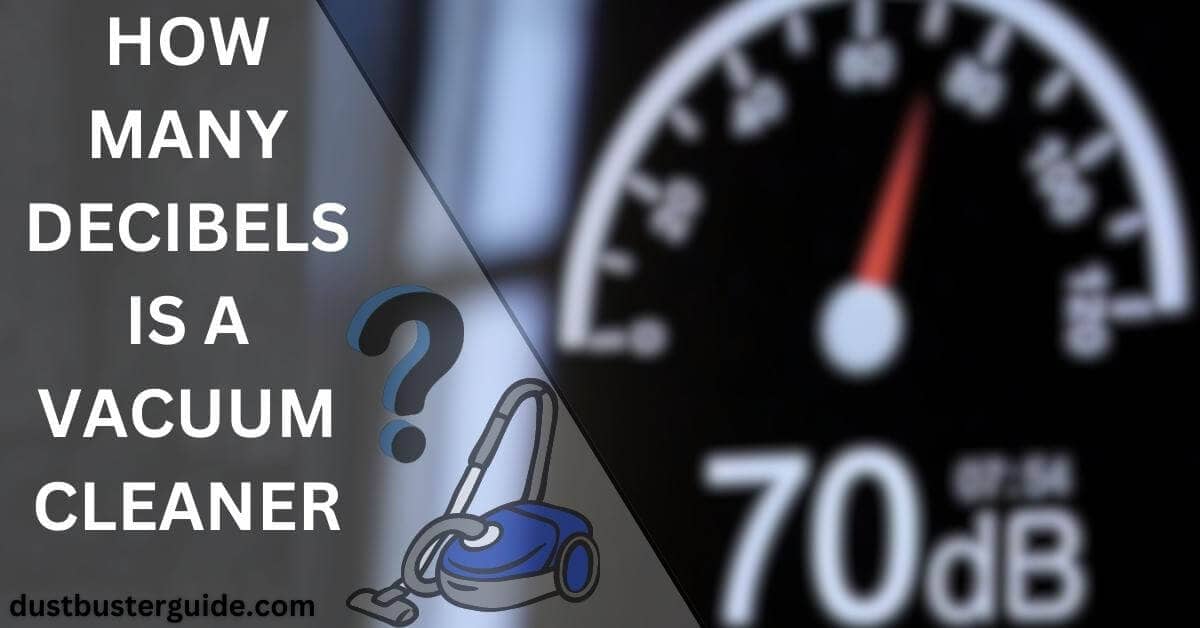Ever wondered about the symphony of sounds emanating from your cleaning companion? Today, we’re unraveling the question: how many decibels is a vacuum cleaner? Picture this: your vacuum as a performer in the household orchestra.
But before you gauge the noise level, here’s the scoop – the decibel level of a vacuum cleaner typically ranges from 60 to 80 decibels. We’re about to explore the nuances of vacuum acoustics, understanding the impact of noise on your cleaning routine.
Join us on this auditory journey as we navigate the realm of decibels, ensuring that your cleaning symphony strikes the right balance between efficiency and harmony in your home!
What Is A Decibel?
Before we go into the specifics of our question how many decibels is a vacuum cleaner, let’s define a decibel.
Noise levels differ greatly between vacuum cleaner types and brands. When the power is raised to its maximum, it is commonly indicated in decibels (dB). DB (decibels) is a unit of measurement for sound pressure.
Because the fan moves a lot of air, vacuum cleaners make a lot of noise. A vacuum cleaner with a high dB level (also known as a “hoover”) makes more noise than one with a low dB level (also known as a “petit hoover”). DB levels are graded on a scale of 0 to 120.
How Many Decibels Is A Vacuum Cleaner – Explained
Before looking up how many decibels is a vacuum cleaner, we assume that you have previously looked up or know what an average decibel volume level is appropriate for the human ear. However, we are here to remind you if you need to know or have forgotten.
At 85 dB or greater, the Occupational Safety and Health Administration advises wearing hearing protection. Noise levels of 70 dB or below are acceptable because they won’t harm your hearing over time.
So the question is, if this is the suggested decibel level, what is the decibel level of a vacuum cleaner that you have at your home, and is that decibel level safe for your hearing? So, the answer is: it depends. As you may be aware, different models of vacuum cleaners have varying specifications, and the same is true for decibel levels. Volumes, like features, have a diverse range of possible values. Most vacuum cleaners have a noise level of 50-80 decibels.
When comparing vacuum cleaners, remember that many have variable volumes depending on the mode. Some more expensive versions will include silent and full-power settings. There are additional “Numatic” vacuum cleaner models with decibel levels ranging from 47 to 49 dB and “Sanitaire” models with decibel levels around 79 dB. The quietest vacuums are always cylinder versions that are meant to produce as little noise as possible (and frequently contain the words “silent” or “quiet” in the product name).
How Loud Is A Vacuum Cleaner In Decibels

We can feel that whenever you plan to buy a vacuum cleaner, you must be at the store staring at all those vacuum cleaners and confusingly asking yourself, what vacuum cleaner can suit you? Nobody enjoys a noisy vacuum cleaner. That’s why you must make the appropriate decision. So don’t worry; in this post, not only we have discussed how many decibels is a vacuum cleaner but also how loud is a vacuum cleaner in decibels.
When comparing vacuum cleaners, it’s crucial to remember that decibels are not a linear scale. Doubling the decibel level does not double the noise intensity. Instead, a 10-decibel rise signifies that the noise is ten times stronger. In other words, a vacuum cleaner with a noise output of 60dB is ten times quieter than one with a noise output of 70 dB. A 60dB vacuum is also 100 times quieter than an 80dB vacuum.
Any vacuum less than 75dB is considered quiet, while those less than 65dB are considered “silent“. Having said that, if your vacuum cleaner produces 75dB, you won’t be able to hold a normal conversation. It’s still very loud but substantially quieter than the most powerful vacuums.
Benefits Of A Quiet Vacuum Cleaner

We are confident that after learning how many decibels is a vacuum cleaner, you will vote for a quiet/silent vacuum cleaner. It is no surprise that you are aware of the benefits of having a quiet vacuum cleaner, but let us go over them in greater detail: Below, we have listed several benefits of a quiet vacuum:
No time restrictions: If you live in a multi-family home or with people who have irregular schedules, it might be challenging to figure out when to vacuum. It is less of an issue with a quiet machine.
Great for Pets: Some animals aren’t troubled by the noise, while it frightens others. These elevated stress levels are harmful to animals. A quiet vacuum cleaner, on the other hand, does not bother your pets.
Great for Humans: Just as loud noise can boost stress levels in animals, some studies show that the same is true for humans. So, a silent vacuum cleaner will not contribute to your stress.
Examples Of Quiet Vacuum Cleaners
Vacuum cleaners are loud. Even the most silent vacuum cleaner makes a sound when you use it. We recommend a quiet vacuum cleaner if you frequently vacuum while your children are asleep or on Sunday mornings. Its maximum noise level is between 60 and 65 decibels. There aren’t many quiet vacuum cleaners available, but here are the most popular:
- AEG VX82-1-ECO – 57dB
- Miele Complete C3 Silence EcoLine – 64dB
- Hoover Telios Extra Pets – 64dB
Side Effects Of A Loud Vacuum Cleaner
Below we also have mentioned some of the side effects of using a loud vacuum cleaner:
- Using your vacuum cleaner might get so loud that you may not hear the doorbell or the phone.
- It can be stressful for children, dogs, and everyone in your household.
Possible Causes For A Noisy Vacuum Cleaner

So you choose the quiet vacuum, which is lovely at first, but after a while, even your quiet vacuum cleaner may make the same noise as your louder ones. Here are a few possible solutions to check before replacing your vacuum with a newer, less noisy vacuum or taking it to a vacuum repair service:
The filter is dirty: Most vacuums include filters. The type will vary according to the vacuum, but most are cleanable. If your vacuum is making a lot of noise, this is the first issue you should check.
Clogged Hose: When a vacuum’s suction is compromised, it becomes much louder. Your vacuum may have become noisier due to a clogged hose. If your vacuum has a flexible hose, you can easily detect any blockages by gently squeezing it along its length.
Brush Bearing: A brush bearing is an important component of the vacuum’s smooth and quiet functioning. If the brush bearing fails, your vacuum will become noisier and perhaps vibrate. You can fix it if you’re comfortable with a slightly more complicated DIY fix. Otherwise, please take it to a repair shop and get it professionally done; it’s not a big deal.
Broken Fan: As dirt is sucked through it, the fan or fan motor might break, dramatically increasing the noise and impairing the vacuum’s capabilities. Unless you’re familiar with the type of repair, this is another advanced repair that you should leave to a professional.
How To Choose The Best Quiet Vacuum Cleaner

Since you now know how many decibels is a vacuum cleaner that you should pick. You should also consider other aspects when shopping for a quiet vacuum cleaner:
- Remember to consider the vacuum’s performance when looking for a low-noise level vacuum cleaner. After all, getting a highly quiet vacuum cleaner is pointless if it’s terrible at vacuuming.
- Also, expect to pay a little extra because many quiet vacuum cleaners are higher-end versions with better parts and more advanced technology. However, this works both ways since a more expensive vacuum cleaner will live longer than a less expensive model. So, what factors should you consider? Here are our top recommendations:
- Bag or a bagless vacuum; Does this not affect noise levels? You’re mistaken. It’s useful to know that a vacuum cleaner with a bag is often much quieter than a vacuum cleaner without a bag. Our study of Bagless vs. Bagged Vacuum Cleaners discovered that a dust bag could significantly reduce noise.
- If you are going to get a quiet vacuum cleaner, you should consider the type. Stick vacuum cleaners are typically much louder than other types of vacuum cleaners. The same is true for handheld vacuum cleaners. So, a robot vacuum cleaner is an option if you don’t want to hear any noise while vacuuming. In many circumstances, this can be configured to work even when you are not at home. That way, you won’t be bothered by any noise. A robot vacuum cleaner is more of a supplemental vacuum cleaner which is more for sure worth having as a cleaning gadget.
Places To Find The Noise(dB) Level For A Type Of Vacuum Cleaner

Look for the dB level listed on the model, bag or bagless, whatever vacuum cleaner you purchase. Customers sometimes need clarification because they need help locating where the dB level of a vacuum cleaner is indicated. For your convenience, below, we have specified spots where you can discover the noise level of your vacuum cleaner. Let’s have a look:
- The manufacturer may have used decibels or noise levels to describe the dB level on the vacuum cleaner’s packaging, box, or label.
- You can check the vacuum’s specifications online or in the user manual if they are not specified anywhere on the label or box.
- If you’re still having trouble finding the decibel levels for your vacuum cleaner, get the numbers directly from the maker.
Conclusion
We hope our article has helped you figure out how many decibels is a vacuum cleaner and what decibel level might make it a loud or quiet vacuum cleaner. Vacuum cleaners often produce 70dB to 80dB of noise. However, some quieter variants are on the market, with the quietest producing a noise output of only 64 dB. Quiet vacuum cleaners are frequently bagged and more expensive than noisier ones.
FAQs
What affects a vacuum’s noise level?
Several elements influence how noisy a vacuum cleaner is. The size of the motor, whether it is suspended, how effective the airflow through the vacuum is, and how much noise insulation surrounds the motor are some of the most critical.
Does a silent vacuum cleaner exist?
There are no fully silent vacuum cleaners; all produce noise. Vacuums with a noise output of less than 65dB are considered “silent,” as they allow for normal speech.
Are loud vacuum cleaners more effective?
No, we discovered that noisy vacuum cleaners are ineffective (on average.) In reality, very noisy vacuum cleaners are frequently poorly built.
What do 70 decibels sound like?
Vacuum cleaners often make noise in the 70-75 decibel range. It refers to the operation of a refrigerator or fan activation. It’s not particularly loud, and most people won’t be able to hear it over normal talk.
How loud is too loud for pets?
Anything beyond 85 decibels (dB) is too loud for dogs to hear and can lead to hearing damage (source). So make sure your vacuum cleaner has a dB level of around 60 to 70 dB.
How Many Decibels Is Dyson V7?
The Dyson V7 vacuum cleaner produces approximately 70-74 decibels of noise during operation.
What Is The World’s Quietest Vacuum?
The Miele Complete C3 Silence EcoLine is often considered one of the world’s quietest vacuums, operating at around 64 decibels.

